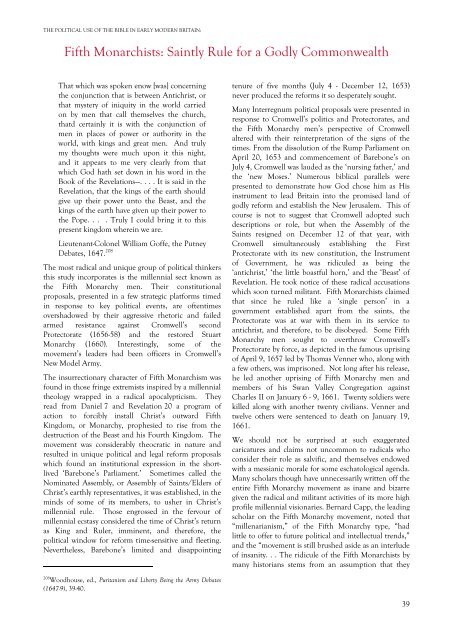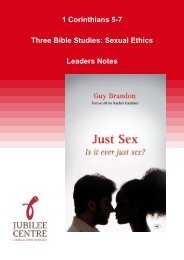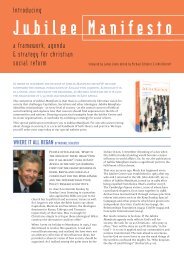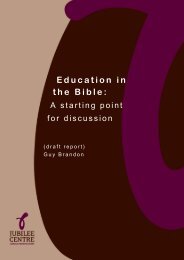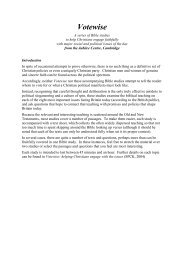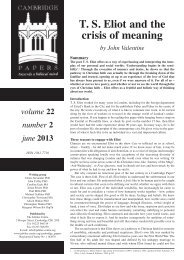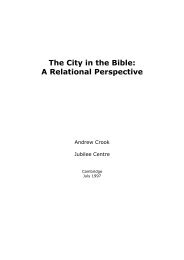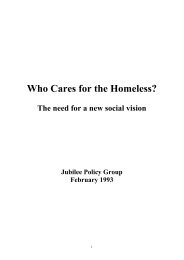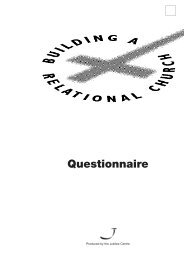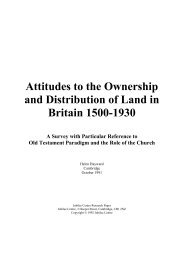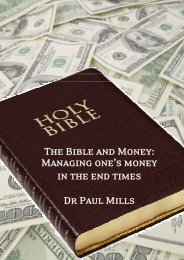Report Template - Jubilee Centre
Report Template - Jubilee Centre
Report Template - Jubilee Centre
You also want an ePaper? Increase the reach of your titles
YUMPU automatically turns print PDFs into web optimized ePapers that Google loves.
THE POLITICAL USE OF THE BIBLE IN EARLY MODERN BRITAIN:<br />
Fifth Monarchists: Saintly Rule for a Godly Commonwealth<br />
That which was spoken enow [was] concerning<br />
the conjunction that is between Antichrist, or<br />
that mystery of iniquity in the world carried<br />
on by men that call themselves the church,<br />
thatd certainly it is with the conjunction of<br />
men in places of power or authority in the<br />
world, with kings and great men. And truly<br />
my thoughts were much upon it this night,<br />
and it appears to me very clearly from that<br />
which God hath set down in his word in the<br />
Book of the Revelations—. . . . It is said in the<br />
Revelation, that the kings of the earth should<br />
give up their power unto the Beast, and the<br />
kings of the earth have given up their power to<br />
the Pope. . . . Truly I could bring it to this<br />
present kingdom wherein we are.<br />
Lieutenant-Colonel William Goffe, the Putney<br />
Debates, 1647. 208<br />
The most radical and unique group of political thinkers<br />
this study incorporates is the millennial sect known as<br />
the Fifth Monarchy men. Their constitutional<br />
proposals, presented in a few strategic platforms timed<br />
in response to key political events, are oftentimes<br />
overshadowed by their aggressive rhetoric and failed<br />
armed resistance against Cromwell’s second<br />
Protectorate (1656-58) and the restored Stuart<br />
Monarchy (1660). Interestingly, some of the<br />
movement’s leaders had been officers in Cromwell’s<br />
New Model Army.<br />
The insurrectionary character of Fifth Monarchism was<br />
found in those fringe extremists inspired by a millennial<br />
theology wrapped in a radical apocalypticism. They<br />
read from Daniel 7 and Revelation 20 a program of<br />
action to forcibly install Christ’s outward Fifth<br />
Kingdom, or Monarchy, prophesied to rise from the<br />
destruction of the Beast and his Fourth Kingdom. The<br />
movement was considerably theocratic in nature and<br />
resulted in unique political and legal reform proposals<br />
which found an institutional expression in the shortlived<br />
‘Barebone’s Parliament.’ Sometimes called the<br />
Nominated Assembly, or Assembly of Saints/Elders of<br />
Christ’s earthly representatives, it was established, in the<br />
minds of some of its members, to usher in Christ’s<br />
millennial rule. Those engrossed in the fervour of<br />
millennial ecstasy considered the time of Christ’s return<br />
as King and Ruler, imminent, and therefore, the<br />
political window for reform time-sensitive and fleeting.<br />
Nevertheless, Barebone’s limited and disappointing<br />
tenure of five months (July 4 - December 12, 1653)<br />
never produced the reforms it so desperately sought.<br />
Many Interregnum political proposals were presented in<br />
response to Cromwell’s politics and Protectorates, and<br />
the Fifth Monarchy men’s perspective of Cromwell<br />
altered with their reinterpretation of the signs of the<br />
times. From the dissolution of the Rump Parliament on<br />
April 20, 1653 and commencement of Barebone’s on<br />
July 4, Cromwell was lauded as the ‘nursing father,’ and<br />
the ‘new Moses.’ Numerous biblical parallels were<br />
presented to demonstrate how God chose him as His<br />
instrument to lead Britain into the promised land of<br />
godly reform and establish the New Jerusalem. This of<br />
course is not to suggest that Cromwell adopted such<br />
descriptions or role, but when the Assembly of the<br />
Saints resigned on December 12 of that year, with<br />
Cromwell simultaneously establishing the First<br />
Protectorate with its new constitution, the Instrument<br />
of Government, he was ridiculed as being the<br />
‘antichrist,’ ‘the little boastful horn,’ and the ‘Beast’ of<br />
Revelation. He took notice of these radical accusations<br />
which soon turned militant. Fifth Monarchists claimed<br />
that since he ruled like a ‘single person’ in a<br />
government established apart from the saints, the<br />
Protectorate was at war with them in its service to<br />
antichrist, and therefore, to be disobeyed. Some Fifth<br />
Monarchy men sought to overthrow Cromwell’s<br />
Protectorate by force, as depicted in the famous uprising<br />
of April 9, 1657 led by Thomas Venner who, along with<br />
a few others, was imprisoned. Not long after his release,<br />
he led another uprising of Fifth Monarchy men and<br />
members of his Swan Valley Congregation against<br />
Charles II on January 6 - 9, 1661. Twenty soldiers were<br />
killed along with another twenty civilians. Venner and<br />
twelve others were sentenced to death on January 19,<br />
1661.<br />
We should not be surprised at such exaggerated<br />
caricatures and claims not uncommon to radicals who<br />
consider their role as salvific, and themselves endowed<br />
with a messianic morale for some eschatological agenda.<br />
Many scholars though have unnecessarily written off the<br />
entire Fifth Monarchy movement as inane and bizarre<br />
given the radical and militant activities of its more high<br />
profile millennial visionaries. Bernard Capp, the leading<br />
scholar on the Fifth Monarchy movement, noted that<br />
“millenarianism,” of the Fifth Monarchy type, “had<br />
little to offer to future political and intellectual trends,”<br />
and the “movement is still brushed aside as an interlude<br />
of insanity. . . The ridicule of the Fifth Monarchists by<br />
many historians stems from an assumption that they<br />
208<br />
Woodhouse, ed., Puritanism and Liberty Being the Army Debates<br />
(1647-9), 39-40.<br />
39


